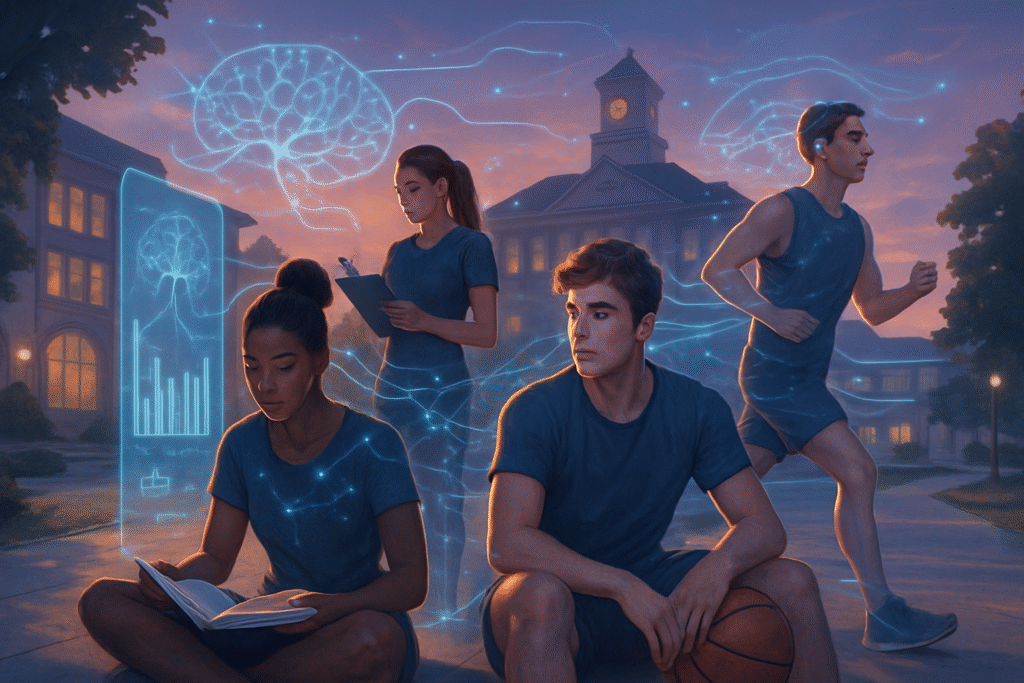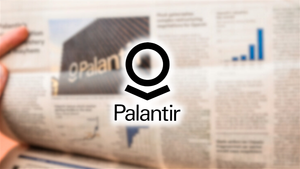
PHILADELPHIA, PA – October 9, 2025 – Temple University has secured a prestigious NCAA Innovations in Research and Practice Grant, marking a significant breakthrough in the application of artificial intelligence for student-athlete well-being. The grant, announced on September 12, 2025, will fund the full development of JournAI, an AI-powered mentorship application designed to provide holistic support for college athletes. This initiative positions Temple University at the forefront of leveraging AI for personalized wellness and development, signaling a new era for student support in collegiate sports.
JournAI, envisioned as an AI-driven virtual mentor named "Sam," aims to guide student-athletes through the multifaceted challenges of their demanding lives. From career planning and leadership skill development to crucial mental health support and financial literacy, Sam will offer accessible, confidential, and personalized assistance. The project's immediate significance lies in its recognition by the NCAA, which selected Temple from over 100 proposals, underscoring the innovative potential of AI to enhance the lives of student-athletes beyond their athletic performance.
The AI Behind the Mentor: Technical Details and Distinctive Approach
JournAI functions as an AI-powered mentor, primarily through text-based interactions with its virtual persona, "Sam." This accessible format is critical, allowing student-athletes to engage with mentorship opportunities directly on their mobile devices, circumventing the severe time constraints imposed by rigorous training, competition, and travel schedules. The core functionalities span a wide range of life skills: career planning, leadership development, mental health support (offering an unbiased ear and a safe space), and financial literacy (covering topics like loans and money management). The system is designed to foster deeper, more holistic conversations, preparing athletes for adulthood.
While specific proprietary technical specifications remain under wraps, JournAI's text-based interaction implies the use of advanced Natural Language Processing (NLP) capabilities. This allows "Sam" to understand athlete input, generate relevant conversational responses, and guide discussions across diverse topics. The robustness of its underlying AI model is evident in its ability to draw from various knowledge domains and personalize interactions, adapting to the athlete's specific needs. It's crucial to distinguish this from an email-based journaling product also named "JournAI"; Temple's initiative is an app-based virtual mentor for student-athletes.
This approach significantly differs from previous student-athlete support mechanisms. Traditional programs often struggle with accessibility due to scheduling conflicts and resource limitations. JournAI bypasses these barriers by offering on-demand, mobile-first support. Furthermore, while conventional services often focus on academic eligibility, JournAI emphasizes holistic development, acknowledging the unique pressures student-athletes face. It acts as a complementary tool, preparing athletes for more productive conversations with human staff rather than replacing them. The NCAA's endorsement, with Temple being one of only three institutions to receive the grant, highlights the strong validation from a crucial industry stakeholder, though broader AI research community reactions are yet to be widely documented beyond this recognition.
Market Implications: AI Companies, Tech Giants, and Startups
The advent of AI-powered personalized mentorship, exemplified by JournAI, carries substantial competitive implications for AI companies, tech giants, and startups across wellness, education, and HR sectors. Companies specializing in AI development, particularly those with strong NLP and machine learning capabilities, stand to benefit significantly by developing the core technologies that power these solutions.
Major tech companies and AI labs will find that hyper-personalization becomes a key differentiator. Generic wellness or educational platforms will struggle to compete with solutions that offer tailored experiences based on individual needs and data. This shift necessitates heavy investment in R&D to refine AI models capable of empathetic and nuanced guidance. Companies with robust data governance and ethical AI frameworks will also gain a strategic advantage, as trust in handling sensitive personal data is paramount. The trend is moving towards "total wellness platforms" that integrate various aspects of well-being, encouraging consolidation or strategic partnerships.
JournAI's model has the potential to disrupt existing products and services by enhancing them. Traditional student-athlete support programs, often reliant on peer mentorship and academic advisors, can be augmented by AI, providing 24/7 access to guidance and covering a wider range of topics. This can alleviate the burden on human staff and offer more consistent, data-driven support. Similarly, general mentorship programs can become more scalable and effective through AI-driven matching, personalized learning paths, and automated progress tracking. While AI cannot replicate the full empathy of human interaction, it can provide valuable insights and administrative assistance. Companies that successfully combine AI's efficiency with human expertise through hybrid models will gain a significant market advantage, focusing on seamless integration, data privacy, and specialized niches like student-athlete wellness.
Broader Significance: AI Landscape and Societal Impact
JournAI fits squarely into the broader AI landscape as a powerful demonstration of personalized wellness and education. It aligns with the industry's shift towards individualized solutions, leveraging AI to offer tailored support in mental health, career development, and life skills. This trend is already evident in various AI-driven health coaching, fitness tracking, and virtual therapy platforms, where users are increasingly willing to share data for personalized guidance. In education, AI is revolutionizing learning experiences by adapting content, pace, and difficulty to individual student needs, a principle JournAI applies to holistic development.
The potential impacts on student-athlete well-being and development are profound. JournAI offers enhanced mental wellness support by providing a readily available, safe, and judgment-free space for emotional expression, crucial for a demographic facing immense pressure. It can foster self-awareness, improve emotional regulation, reduce stress, and build resilience. By guiding athletes through career planning and financial literacy, it prepares them for life beyond sports, where only a small percentage will turn professional.
However, the integration of AI like JournAI also raises significant concerns. Privacy and data security are paramount, given the extensive collection of sensitive personal data, including journal entries. Risks of misuse, unauthorized access, and data breaches are real, requiring robust data protection protocols and transparent policies. Over-reliance on AI is another concern; while convenient, it could diminish interpersonal skills, hinder critical thinking, and create a "false sense of support" if athletes forgo necessary human professional help during crises. AI's current struggle with understanding complex human emotions and cultural nuances means it cannot fully replicate the empathy of human mentors. Other ethical considerations include algorithmic bias, transparency (users need to understand why AI suggests certain actions), and consent for participation.
Comparing JournAI to previous AI milestones reveals its reliance on recent breakthroughs. Early AI in education (1960s-1970s) focused on basic computer-based instruction and intelligent tutoring systems. The internet era (1990s-2000s) expanded access, with adaptive learning platforms emerging. The most significant leap, foundational for JournAI, comes from advancements in Natural Language Processing (NLP) and large language models (LLMs), particularly post-2010. The launch of ChatGPT (late 2022) enabled natural, human-like dialogue, allowing AI to understand context, emotion, and intent over longer conversations – a capability crucial for JournAI's empathetic interaction. Thus, JournAI represents a sophisticated evolution of intelligent tutoring systems applied to emotional and mental well-being, leveraging modern human-computer interaction.
Future Developments: The Road Ahead for AI Mentorship
The future of AI-powered mentorship, exemplified by JournAI, promises a deeply integrated and proactive approach to individual development. In the near term (1-5 years), AI mentors are expected to become highly specialized, delivering hyper-personalized experiences with custom plans based on genetic information, smart tracker data, and user input. Real-time adaptive coaching, adjusting training regimens and offering conversational guidance based on biometric data (e.g., heart rate variability, sleep patterns), will become standard. AI will also streamline administrative tasks for human mentors, allowing them to focus on more meaningful interactions, and smarter mentor-mentee matching algorithms will emerge.
Looking further ahead (5-10+ years), AI mentors are predicted to evolve into holistic well-being integrators, seamlessly combining mental health monitoring with physical wellness coaching. Expect integration with smart environments, where AI interacts with smart home gyms and wearables. Proactive preventive care will be a hallmark, with AI predicting health risks and recommending targeted interventions, potentially syncing with medical professionals. Experts envision AI fundamentally reshaping healthcare accessibility by providing personalized health education adapted to individual literacy levels and cultural backgrounds. The goal is for AI to develop a more profound understanding and nuanced response to human emotions, though this remains a significant challenge.
For student-athlete support, AI offers a wealth of future applications. Beyond holistic development and transition support (like JournAI), AI can optimize performance through personalized training, injury prevention (identifying risks with high accuracy), and optimized nutrition and recovery plans. Academically, adaptive learning will tailor content to individual styles. Crucially, AI mentors will continue to provide 24/7 confidential mental health support and financial literacy education, especially pertinent for navigating Name, Image, and Likeness (NIL) income. Challenges for widespread adoption include addressing ethical concerns (bias, misinformation), improving emotional intelligence and nuanced understanding, ensuring data quality, privacy, and security, navigating regulatory gaps, and overcoming infrastructure costs. Experts consistently predict that AI will augment, not replace, human intelligence, emphasizing a collaborative model where human mentors remain crucial for interpreting insights and providing emotional support.
Wrap-up: A New Dawn for Student-Athlete Support
Temple University's JournAI project is a pivotal development in the landscape of AI-powered wellness and mentorship. Its core mission to provide accessible, personalized, and holistic support for student-athletes through an AI-driven virtual mentor marks a significant step forward. By addressing critical aspects like mental health, career readiness, and financial literacy, JournAI aims to equip student-athletes with the tools necessary for success both during and after their collegiate careers, enhancing their overall well-being.
This initiative's significance in AI history lies in its sophisticated application of modern AI, particularly advanced NLP and large language models, to a traditionally underserved and high-pressure demographic. It showcases AI's potential to move beyond mere information retrieval to offer empathetic, personalized guidance that complements human interaction. The NCAA grant not only validates Temple's innovative approach but also signals a broader acceptance of AI as a legitimate tool for fostering personal development within educational and athletic institutions.
The long-term impact on student-athletes could be transformative, fostering greater resilience, self-awareness, and preparedness for life's transitions. For the broader educational and sports technology landscape, JournAI sets a precedent, likely inspiring other institutions to explore similar AI-driven mentorship models. This could lead to a proliferation of personalized support systems, potentially improving retention, academic performance, and mental health outcomes across various student populations.
In the coming weeks and months, observers should closely watch the expansion of JournAI's pilot program and the specific feedback gathered from student-athletes. Key metrics on its efficacy in improving mental health, academic success, and career readiness will be crucial. Furthermore, attention should be paid to how Temple University addresses data privacy, security, and ethical considerations as the app scales. The evolving balance between AI-driven support and essential human interaction will remain a critical point of observation, as will the emergence of similar initiatives from other institutions, all contributing to a new era of personalized, AI-augmented student support.
This content is intended for informational purposes only and represents analysis of current AI developments.
TokenRing AI delivers enterprise-grade solutions for multi-agent AI workflow orchestration, AI-powered development tools, and seamless remote collaboration platforms. For more information, visit https://www.tokenring.ai/.





